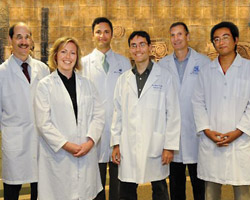 |
 |
Genes May Spur Optic Nerve Regeneration
 |
The Miller School team, from left to right:
Vance Lemmon, Ph.D., Darcie Moore; Jeffrey Goldberg, M.D., Ph.D., Murray Blackmore, Ph.D., John Bixby, Ph.D., and Ying Hu, M.D., Ph.D. |
In a big step forward for visual science and neuroscience, Miller School researchers have identified a family of genes that may control the ability of the optic nerve to regenerate, possibly restoring sight. The finding, published in the October 9 issue of Science, could lead to treatment advances for glaucoma and optic nerve stroke, as well as spinal cord injury and other neurodegenerative diseases of the brain and spinal cord.
Researchers showed retinal ganglion cells (RGCs), the neurons whose axons carry all visual information from the eye to the brain, regenerated in the optic nerve after one of the genes in the Kruppel-like factor (KLF) family was suppressed.
“Neurons in the central nervous system grow normally during development and then they turn off their growth ability, such that they can’t reconnect properly in adults following injury or disease,” says Jeffrey Goldberg, M.D., Ph.D., assistant professor of ophthalmology at the Bascom Palmer Eye Institute and senior author of the study. “Scientists have mostly studied the environment where the growth failure occurs—for example, the optic nerve. We were looking to see if there was a problem within the RGCs themselves.”
Co-author and neuroscience graduate student Darcie L. Moore discovered that Kruppel-like factor-4 (KLF4) was a transcriptional repressor of axon growth in RGCs and other central nervous system neurons. After Murray Blackmore, Ph.D., a post-doctoral fellow at The Miami Project to Cure Paralysis, found a related gene, KLF6, in neurons from the cerebral cortex, the team expanded its study to the whole KLF family. Other co-authors include Vance Lemmon, Ph.D., professor of neurological surgery; John Bixby, Ph.D., professor of molecular and cellular pharmacology; and Ying Hu, M.D., Ph.D., a post-doctoral fellow.
|
 |
 |


